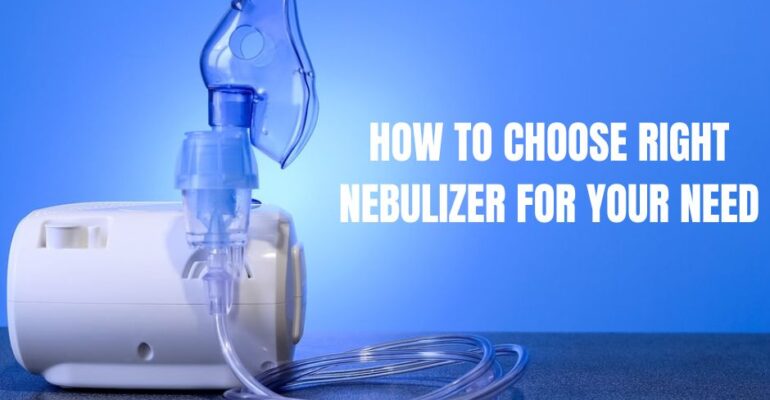How to Choose the Right Nebulizer for Your Needs
August 20, 2024 2024-08-20 9:35
How to Choose the Right Nebulizer for Your Needs
Choosing the right nebulizer is essential for effectively managing respiratory conditions such as asthma, chronic obstructive pulmonary disease (COPD), and other lung-related illnesses. With various types of nebulizers available, each offering different features and benefits, selecting the most suitable one can be overwhelming. This guide will help you understand the different types of nebulizers, their key features, and how to choose the right one for your specific needs.
Understanding Nebulizers
A nebulizer is a medical device that converts liquid medication into a fine mist or aerosol, which can then be inhaled directly into the lungs. This method is particularly beneficial for people who have difficulty using inhalers or need a more prolonged treatment session. Nebulizers are commonly used to administer medications like bronchodilators, corticosteroids, and antibiotics.
Types of Nebulizers
There are three main types of nebulizers: jet nebulizers, ultrasonic nebulizers, and mesh nebulizers. Each has its own advantages and disadvantages, making them suitable for different situations.
- Jet Nebulizers
- How They Work: Jet nebulizers use compressed air to turn liquid medication into a fine mist. The air is pumped through a tube into the nebulizer cup, where it mixes with the medication and creates a mist that can be inhaled.
- Pros: They are generally more affordable and can be used with a wide variety of medications. Jet nebulizers are also durable and can handle frequent use.
- Cons: Jet nebulizers tend to be larger and noisier compared to other types. They also require a power source, which can limit portability.
- Ultrasonic Nebulizers
- How They Work: Ultrasonic nebulizers use high-frequency sound waves to create a mist from the medication. The sound waves cause vibrations that generate a fine aerosol.
- Pros: These nebulizers are quieter and often faster than jet nebulizers. They are also more compact, making them easier to carry around.
- Cons: Ultrasonic nebulizers can be more expensive and may not be compatible with all types of medications, especially those that require a certain particle size.
- Mesh Nebulizers
- How They Work: Mesh nebulizers use a vibrating mesh or membrane with tiny holes to push the medication through, creating a fine mist. This method allows for a very efficient and consistent delivery of medication.
- Pros: Mesh nebulizers are the most portable option, often battery-operated, and very quiet. They are also efficient in delivering medication with minimal waste.
- Cons: They tend to be the most expensive type and may require more careful maintenance due to the delicate mesh.
Key Considerations When Choosing a Nebulizer
When selecting a nebulizer, it’s important to consider several factors that will influence how well the device meets your needs.
- Portability
- If you need to use your nebulizer while traveling or on the go, portability is a key factor. Mesh nebulizers are typically the most portable, often small enough to fit in a pocket or bag and run on batteries. Jet nebulizers are usually less portable due to their size and the need for an external power source.
- Noise Level
- Noise can be a concern, especially if you need to use your nebulizer frequently or in public places. Jet nebulizers are generally louder, while ultrasonic and mesh nebulizers offer quieter operation, making them more suitable for use in quiet environments or at night.
- Medication Compatibility
- Not all nebulizers are compatible with all types of medications. Jet nebulizers are versatile and can handle most medications. In contrast, ultrasonic nebulizers may not be suitable for medications that require precise particle sizes or are heat-sensitive. Mesh nebulizers, while efficient, can sometimes have limitations with certain medication viscosities.
- Treatment Time
- The time it takes to deliver a full dose of medication can vary depending on the type of nebulizer. Jet nebulizers may take longer, typically around 10-15 minutes per session. Ultrasonic and mesh nebulizers tend to be faster, with treatment times often reduced to 5-10 minutes.
- Ease of Use and Maintenance
- Consider how easy the nebulizer is to assemble, disassemble, and clean. Mesh nebulizers may require more delicate handling and careful cleaning to avoid damaging the mesh. Jet nebulizers, while more robust, can have more parts to clean. Ultrasonic nebulizers are generally easier to maintain but still require regular cleaning to ensure optimal performance.
- Cost
- Budget is always a consideration when purchasing medical equipment. Jet nebulizers are typically the most affordable, making them a good option for those on a tight budget. Ultrasonic and mesh nebulizers are more expensive but may offer added benefits such as portability, speed, and quiet operation. It’s important to balance cost with the features you need most.
- Power Source
- Consider where and how often you’ll be using your nebulizer. If you need a nebulizer for home use only, a jet nebulizer that plugs into an outlet might be sufficient. However, if you require a nebulizer for travel or on-the-go use, a battery-operated mesh or ultrasonic nebulizer would be more convenient.
Conclusion
Choosing the right nebulizer involves balancing your specific needs with the features and capabilities of different types of devices. Whether you prioritize portability, noise level, medication compatibility, or cost, there’s a nebulizer that can meet your requirements. Consulting with your healthcare provider can also help you determine which nebulizer is best suited for your condition and lifestyle. By carefully considering these factors, you can select a nebulizer that ensures effective and comfortable treatment, helping you manage your respiratory condition more effectively.
4o

